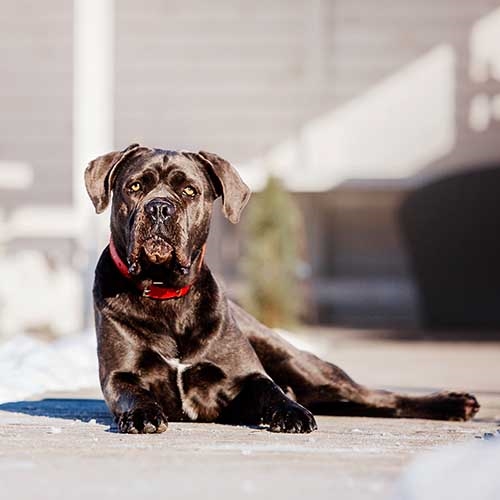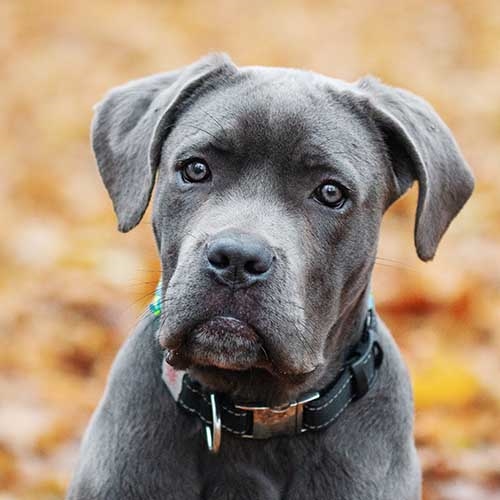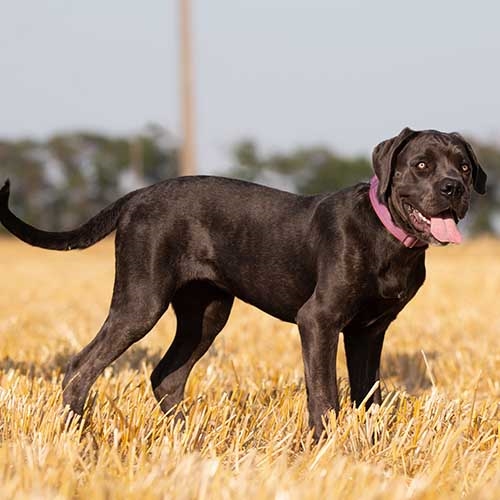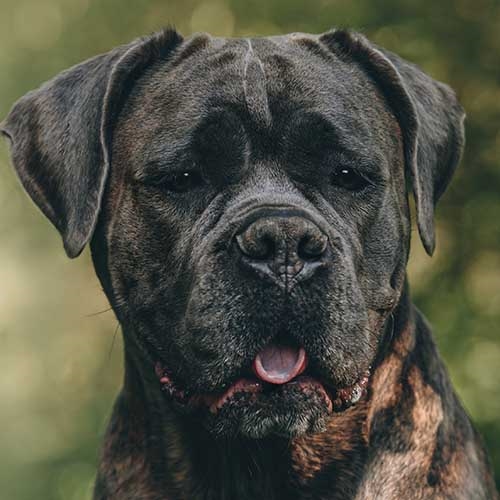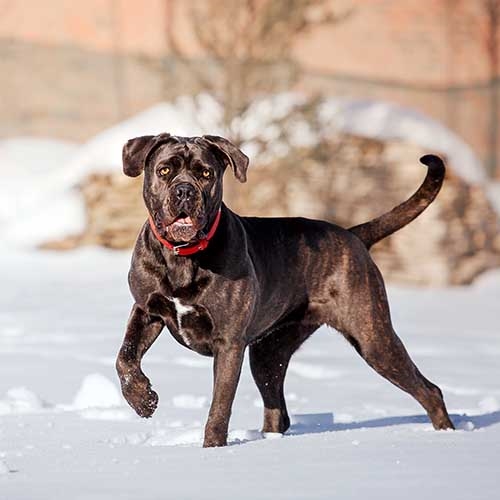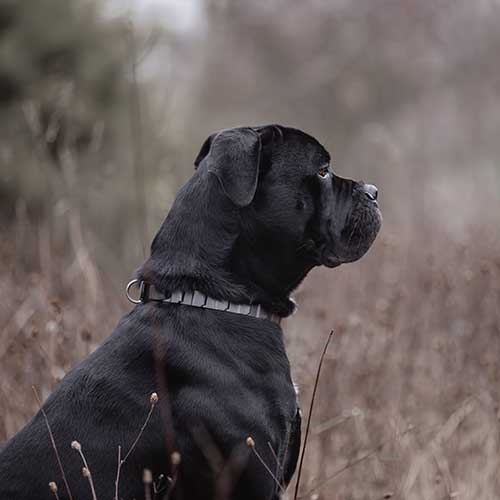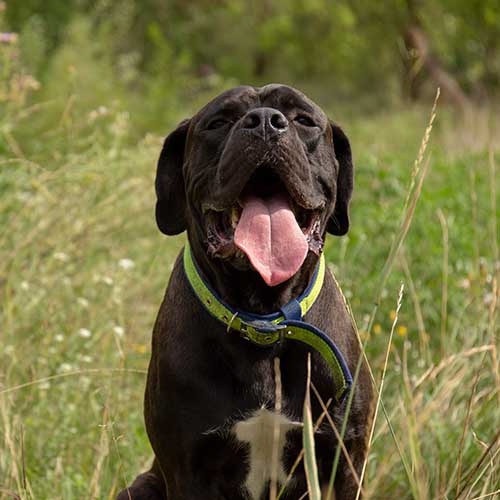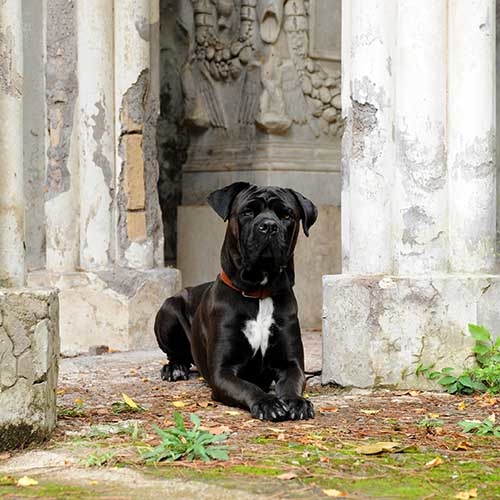| Size | Large |
|---|---|
| Average height | 58-70 cm |
| Average weight | 40-50 kg |
| Average lifespan | Under 10 years |
| Minimum exercise (per day) | 2 hours |
| Coat length | Short |
| Minimum cost (per month) | £80 |
Cane Corsos are a Mastiff type breed of dog, thought to have originally descended from a Roman war dog. When war was over they were used as successful hunters and worked on farms, protecting, guarding and rounding up livestock.
Unfortunately because of their imposing, handsome good looks some Cane Corso have fallen victim to tail docking and ear cropping. Tail docking in the Cane Corso breed is illegal in the UK and must be reported to RSPCA. Ear cropping is also illegal in the UK and needs to be reported to RSPCA if discovered.
Common health problems in Cane Corsos
The Cane Corso is a relatively uncommon breed in the UK. Because of this, we can’t be sure which health conditions will be more common with the breed.
There is some evidence that the following conditions may be of concern in this breed:
- Hip dysplasia – where the hip joint doesn’t fit together perfectly, which will eventually lead to arthritis. Before breeding, dogs should be screened by x-rays through the BVA/Kennel Club Hip Dysplasia Scheme.
- Elbow dysplasia – where the elbow joint doesn’t fit together perfectly, which will eventually lead to arthritis. Before breeding, dogs should be screened by x-rays through the BVA/KC Elbow Dysplasia Scheme.
- Gastric Dilatation Volvulus (GDV) – often known as ‘bloat’, this is where the stomach twists. It is an emergency and requires urgent veterinary attention.
- A range of eye problems including entropion, ectropion and cherry eye.
If you are thinking of buying a Cane Corso puppy, make sure the parents of your puppy have had the relevant health screening to reduce the chances of your puppy being affected by certain conditions.
If you want to minimise the risk of your dog getting health problems due to exaggerated features, you can read our advice on choosing a pedigree dog.
Caring for your Cane Corso
Cane Corsos are traditionally a working breed and their history means that the need to work will likely be a part of their nature, so you’ll need to keep them active. They’ll also enjoy being with the family out and about on fun walks with plenty of opportunity to play and explore.
Cane Corsos and barking
As with any breed, your Cane Corso is likely to make some noise at one time or another. This will be down to their training and individual personality. If you’re having trouble with excessive barking, we’d recommend seeking the advice of an accredited behaviourist.
Training and socialisation
Cane Corsos are large, strong dogs. It’s really important they are trained using positive, reward-based training from a young age to prevent any jumping up or pulling on the lead. They’re bred to work with their owners and would likely enjoy training sessions, but due to their size they’re better suited to experienced dog owners. If you do need a bit of extra help training, we’d recommend taking your pup to an accredited dog trainer.
You’ll need to socialise your Cane Corso with lots of different people and experiences from a young age. This will help them grow into a happy, confident adult dog.
As with any dog, you should never leave your Cane Corso alone for longer than four hours. You’ll need to train them that it’s OK to be alone from a young age to make sure they are comfortable with being left.
Exercise
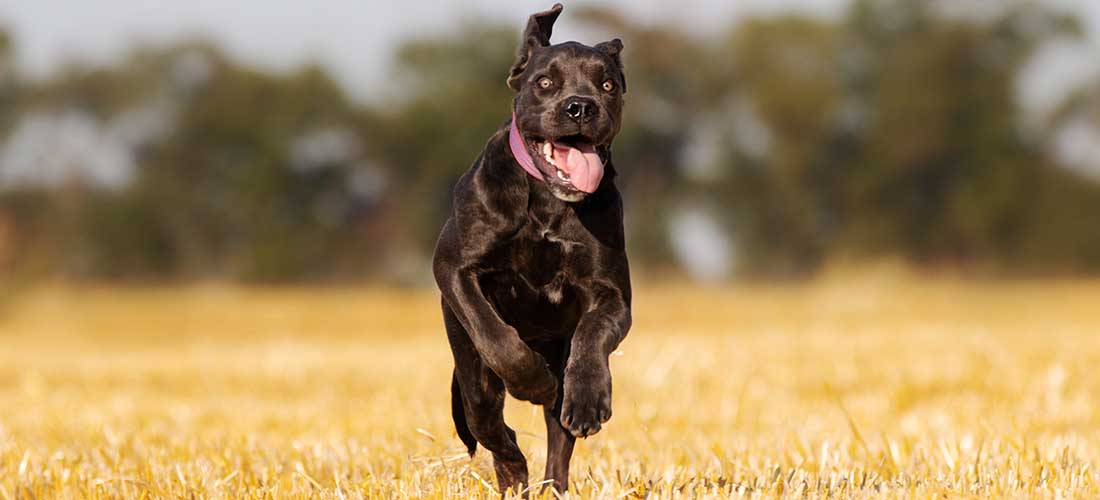
Cane Corsos are really active dogs and need plenty of exercise to keep them happy and healthy. As a heavy breed of dog they shouldn’t be expected to run for miles, but as working dogs, they love to be on the go and definitely aren’t couch potatoes!
Your Cane Corso will need around two hours’ exercise every day. This should include a couple of longer, brisk walks (or even a jog) with time to play off-lead somewhere secure. On top of this, they’ll love the chance to do lots of short training sessions throughout the day. Puzzle games are perfect for Cane Corsos because they enjoy having something to focus on.
Cane Corsos need a lot of exercise and love to spend time with you, so why not combine those? Take a look at our ideas of exercise you can do with your dog.
Grooming
Cane Corsos have short fur so are fairly low maintenance when it comes to grooming. A weekly brush should be enough to keep on top of dead hairs. Like any dog, they do shed and will do so more in spring and autumn so remember you may need to vacuum a little more then.
Despite not needing much attention for their fur, Cane Corsos are known to drool. So if you’re not keen on the idea of a bit of drool on furniture (and walls) they may not be the breed for you! If you do have a Cane Corso, it’s a good idea to keep a drool cloth with you at all times.
Cane Corsos and children
All dogs are different and behaviour can vary widely within a breed. There are many owners who report that their Cane Corso fits in well with their family. All dogs should be given the right training and socialisation, so they know what’s expected of them.
We really wouldn’t recommend having a Cane Corso if you have small children as they could get hurt if they are accidentally knocked over. They suit adult-only homes best, or families with older children or teenagers who understand the breed.
Remember to always supervise your dog around children and learn the signs that playtime is becoming too much to avoid conflict. Check out our guide on kids and dogs for more information.
Cane Corsos and other pets
Your Cane Corso will need lots of positive socialisation experiences from a young age to make sure they’re happy meeting new dogs out and about.
If they’ve grown up with another pet in the home, your Cane Corso is likely to be OK with them but you should always supervise them with other pets.
Food
Your Cane Corso’s diet will vary depending on their age and any health conditions they may have. You’ll need to feed them a complete, balanced dog food to keep them slim and healthy.
Your vet will be able to tell you how much your dog should be eating. You should feed a healthy Cane Corso a good quality, commercially available and complete dog food and it’s usually recommended to split their daily allowance into two meals. If you give your dog an occasional treat or use treats for training, remember to take this into account and reduce their daily allowance. Treats shouldn’t make up more than 10% of their calories or they can unbalance their diet.
You should try to feed your dog at the same time every day to get them into a routine. Remember to leave a gap after eating and before exercising.
The cost of owning a Cane Corso
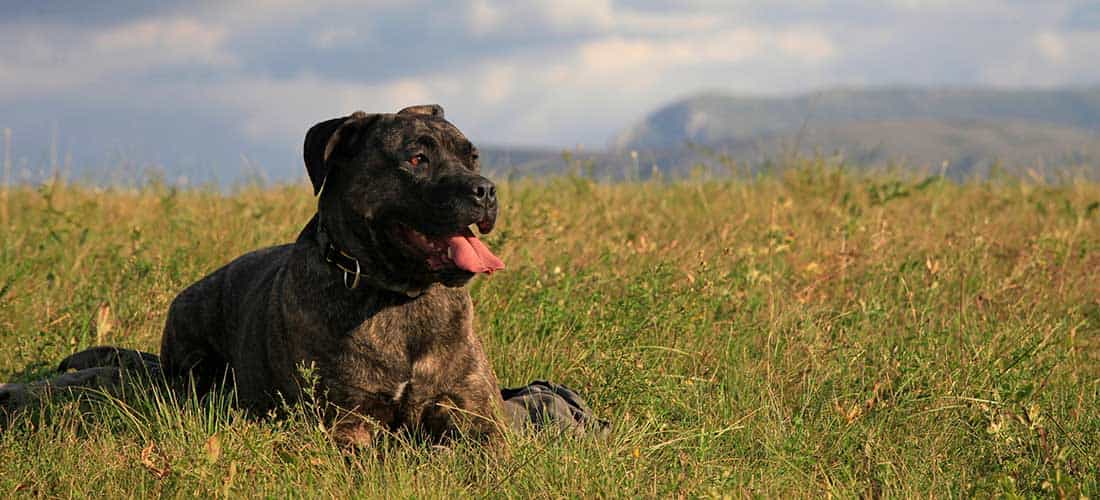
Having a Cane Corso will cost a minimum of £80 per month after purchase and set-up costs and up to £13,000 across their lifetime.
Costs you’ll need to think about include:
Purchase costs
Adopting an adult dog from a rescue centre may be a more cost-effective option, as well as having the added advantage of offering a home to a pet without one – check if the rehoming centre you’re looking at asks for a donation for rehoming.
If instead you’re buying a Cane Corso puppy from a breeder, you’ll need to factor in this cost. Beware unusually cheap puppies as they could come from a puppy farm or disreputable breeder. If you want to buy a pedigree puppy, take a look at our advice on finding a good breeder.
Set-up costs
- Puppy vaccines – if you rescue a dog, reputable centres will often vaccinate them for you. Remember that ongoing booster vaccinations will be needed to continue their immunity.
- Neutering – you should usually arrange for your dog to be neutered at around 12 months old, though your vet will be able to advise you exactly when is best. Check prices at your local practice as these will depend on your vet and where you live. Some rescue centres will neuter any dogs they rehome, saving you this cost.
- Equipment – including a collar and tags, lead, harness, dog beds, dog bowls, pet-safe toothpaste and toothbrushes, grooming brushes and toys. Keep in mind that all these will need to be replaced with wear or damage or if your dog outgrows or damages them!
Ongoing costs
- Food.
- Preventive healthcare – budget for routine vet visits to help stop your dog getting ill and catch any problems early. They need annual check-ups, vaccinations and regular flea and worming treatments. Check if your vet offers a health care plan as this can help spread the cost throughout the year.
- Vet bills* or pet insurance – if you don’t have pet insurance and your dog needs veterinary treatment for an injury or illness, costs can rapidly mount up. Check what’s covered and what isn’t when comparing policies.
- Accessories – including lots of poo bags, replacing worn toys and grooming accessories, buying doggy toothpaste and any other extras they might need.
Other costs
- Training – basic training is very important and dogs can benefit from formal classes. Some dogs may have, or develop, behavioural problems which might need professional management.
- Boarding – you may also need to budget for boarding or dog sitting costs if you are planning to go away from home on holiday.
- Dog walkers/day-care – you might consider a professional dog walker to keep your dog happy and healthy if you’re unable to get out with your dog enough yourself, or to look after them during the day if you need to be out for more than four hours.
* It’s always better to plan ahead and budget or get pet insurance in case your pet gets injured or unwell. If you are having difficulty with veterinary costs, you can check if you are eligible for treatment at PDSA here.
When you welcome a new dog into your life, consider getting dog insurance straight away before any signs of illness start. This will give you peace of mind that you have some financial support if they ever get sick.
Fun facts
- Although Cane Corsos were mainly bred to be guard dogs, throughout their history they have often been kept as companion pets rather than working dogs (but they still need lots of exercise!).
- Cane Corsos love to be kept occupied and hate being bored. While this is true of most dogs, Cane Corsos like being given specific tasks to make them feel useful.
- Their name comes from the Latin ‘Cohors’ which means ‘guardian’ or ‘protector’.
- They’re an Italian breed of Mastiff and being part of the Mastiff family is why they’re so big.
Getting a Cane Corso
Cane Corsos are sociable and loving dogs who enjoy the company of their owners and being out exploring. In an active home, they can make the perfect pet. If you decide a Cane Corso is right for you, they’ll be your loyal friend for life and never stray far from your side.
Rehoming centres
There are plenty of rescue centres across the country where you may find a Cane Corso. You’ll need to ask any rescue centre about the dog’s history to make sure they will be comfortable in your home. Good rescue centres should let you know of any health and behaviour problems.
Breeders
If you buy a Cane Corso puppy from a breeder, make sure your puppy will be well socialised and have all necessary health checks and vaccinations. We’ve put together some advice to help you find a good breeder.

